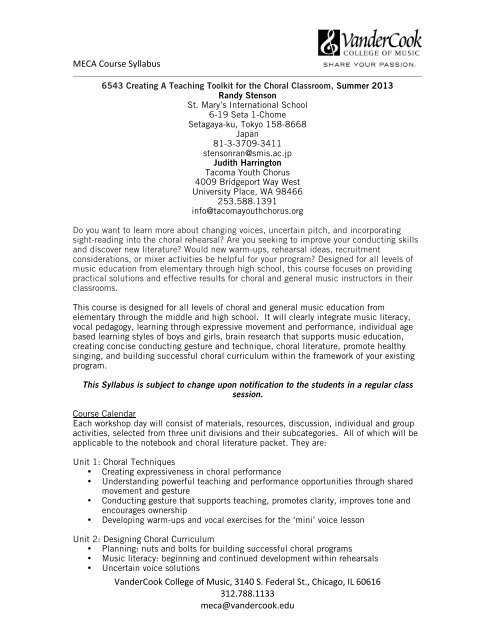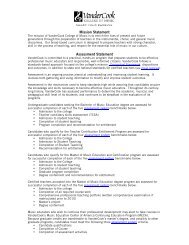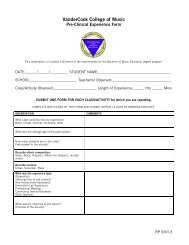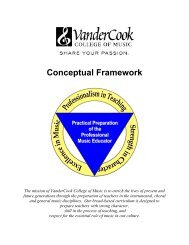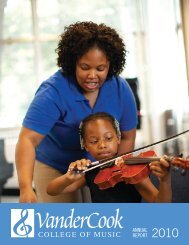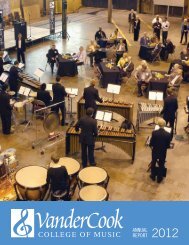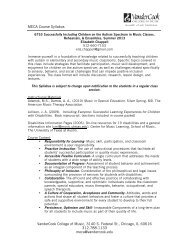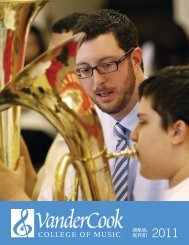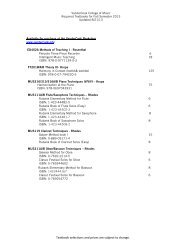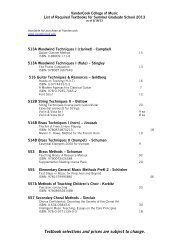MECA Course Syllabus VanderCook College of Music, 3140 S ...
MECA Course Syllabus VanderCook College of Music, 3140 S ...
MECA Course Syllabus VanderCook College of Music, 3140 S ...
Create successful ePaper yourself
Turn your PDF publications into a flip-book with our unique Google optimized e-Paper software.
<strong>MECA</strong> <strong>Course</strong> <strong>Syllabus</strong> <br />
6543 Creating A Teaching Toolkit for the Choral Classroom, Summer 2013<br />
Randy Stenson<br />
St. Mary’s International School<br />
6-19 Seta 1-Chome<br />
Setagaya-ku, Tokyo 158-8668<br />
Japan<br />
81-3-3709-3411<br />
stensonran@smis.ac.jp<br />
Judith Harrington<br />
Tacoma Youth Chorus<br />
4009 Bridgeport Way West<br />
University Place, WA 98466<br />
253.588.1391<br />
info@tacomayouthchorus.org<br />
Do you want to learn more about changing voices, uncertain pitch, and incorporating<br />
sight-reading into the choral rehearsal? Are you seeking to improve your conducting skills<br />
and discover new literature? Would new warm-ups, rehearsal ideas, recruitment<br />
considerations, or mixer activities be helpful for your program? Designed for all levels <strong>of</strong><br />
music education from elementary through high school, this course focuses on providing<br />
practical solutions and effective results for choral and general music instructors in their<br />
classrooms.<br />
This course is designed for all levels <strong>of</strong> choral and general music education from<br />
elementary through the middle and high school. It will clearly integrate music literacy,<br />
vocal pedagogy, learning through expressive movement and performance, individual age<br />
based learning styles <strong>of</strong> boys and girls, brain research that supports music education,<br />
creating concise conducting gesture and technique, choral literature, promote healthy<br />
singing, and building successful choral curriculum within the framework <strong>of</strong> your existing<br />
program.<br />
This <strong>Syllabus</strong> is subject to change upon notification to the students in a regular class<br />
session.<br />
<strong>Course</strong> Calendar<br />
Each workshop day will consist <strong>of</strong> materials, resources, discussion, individual and group<br />
activities, selected from three unit divisions and their subcategories. All <strong>of</strong> which will be<br />
applicable to the notebook and choral literature packet. They are:<br />
Unit 1: Choral Techniques<br />
• Creating expressiveness in choral performance<br />
• Understanding powerful teaching and performance opportunities through shared<br />
movement and gesture<br />
• Conducting gesture that supports teaching, promotes clarity, improves tone and<br />
encourages ownership<br />
• Developing warm-ups and vocal exercises for the ‘mini’ voice lesson<br />
Unit 2: Designing Choral Curriculum<br />
• Planning: nuts and bolts for building successful choral programs<br />
• <strong>Music</strong> literacy: beginning and continued development within rehearsals<br />
• Uncertain voice solutions<br />
<strong>VanderCook</strong> <strong>College</strong> <strong>of</strong> <strong>Music</strong>, <strong>3140</strong> S. Federal St., Chicago, IL 60616 <br />
312.788.1133 <br />
meca@vandercook.edu
<strong>MECA</strong> <strong>Course</strong> <strong>Syllabus</strong> <br />
• Aspects unique to male and female voices<br />
• Games/energizers for teaching and community building<br />
• Choral competence: vocal technique, artistic skills, evaluation, growth<br />
Unit 3: Brain Research For The Choral Classroom<br />
• Cultivating motivation/interest<br />
• Retention: learning that ‘sticks’<br />
• Classroom management skills<br />
• Gender considerations<br />
<strong>Course</strong> Learning Objectives<br />
Students should learn and be able to demonstrate:<br />
• Ability to view your teaching experience with added respect and<br />
understanding.<br />
• Ability to enhance learning, musicality, and music education within the choral<br />
art for your students.<br />
• Participate fully in an experiential learning environment.<br />
• Build a notebook <strong>of</strong> resources (Teaching Took Kit for the Choral Classroom)<br />
from the daily class work. This notebook, therefore, becomes the resource<br />
available for teaching, planning, and expanding in your classrooms and<br />
rehearsals.<br />
• Create shared teaching activities and projects, alone and in groups.<br />
• Create sample lessons that are applicable to your choral curriculum.<br />
<strong>MECA</strong> courses and ISBE Standards<br />
<strong>MECA</strong> courses, by their very nature and design, address the ISBE <strong>Music</strong> Content and<br />
Pr<strong>of</strong>essional Teaching Standards throughout the course content. <strong>Music</strong> technology<br />
courses also incorporate the ISBE Technology Standards.<br />
<strong>VanderCook</strong> Candidate Outcomes Addressed<br />
The outcomes that the <strong>College</strong> strives to develop in its teacher candidates were derived<br />
from the institution’s Conceptual Framework and are expressed in its core dispositions.<br />
This course addresses the following Candidate Outcomes:<br />
1. A high level <strong>of</strong> musicianship<br />
2. Academic ability and diligence leading to a lifetime <strong>of</strong> learning<br />
3. Skill in the process <strong>of</strong> teaching<br />
4. Self-discipline and persistence<br />
5. Interpersonal and intrapersonal skills<br />
6. Good citizenship and personal integrity<br />
7. Building pragmatic links with educational programs in diverse communities<br />
8. Pr<strong>of</strong>essionalism in action word, and appearance<br />
<strong>VanderCook</strong> <strong>College</strong> <strong>of</strong> <strong>Music</strong>, <strong>3140</strong> S. Federal St., Chicago, IL 60616 <br />
312.788.1133 <br />
meca@vandercook.edu
<strong>MECA</strong> <strong>Course</strong> <strong>Syllabus</strong> <br />
<strong>Course</strong> Requirements and Exit Assessment<br />
Out-<strong>of</strong>-class assignments:<br />
Most assignments will be completed during class sessions. A few short assignments may<br />
need to be prepared outside class for presentation during the week. They may include:<br />
• Creating two original movement based warm-ups and presenting them to the<br />
class, that would focus on one or more <strong>of</strong> the following aspects: tone production,<br />
vowel clarity, rhythm, intonation, diction, harmony, mixed-meter, syncopation,<br />
articulations.<br />
• Using the choral literature packet, choose a challenging area (2- 4 measures) <strong>of</strong> a<br />
specific piece and creating a pre-reading tool prior to introducing the song.<br />
• Select one piece from the packet to direct. Discuss your vision for the piece using<br />
gesture and movement in conveying musicality or in problem solving.<br />
In-class Assignments and activities for Creating the Tool Kit Notebook:<br />
• Create rhythm & melodic cards in sequential difficulty.<br />
• Outline a movement based rehearsal plan for a class period or selected piece <strong>of</strong><br />
music.<br />
• Build sequential set <strong>of</strong> movement prompts for specific choral results.<br />
• Game share-share and lead a familiar game or fun musical support activity.<br />
• Written review <strong>of</strong> a music and movement or a reflection on using movement tools<br />
in your rehearsal.<br />
Grading: Grades will be determined using the following criteria:<br />
Building Your Tool-Box:<br />
Two Movement Based Warmups 100<br />
Literature pre-reading tool 100<br />
Movement conducting section 100<br />
Rhythm/Melodic cards 50<br />
Movement based Rehearsal Outline 100<br />
Movement prompts 100<br />
Game share 50<br />
Written Review/Reflection 100<br />
Class attendance and active participation 300<br />
Grading Scale<br />
A = 1000-930<br />
B = 920-850<br />
C = 849-770<br />
D = 769-680<br />
F = 680 & below<br />
Attendance and Conduct<br />
Attendance at all classes for the full day is required. A student's grade will be reduced by<br />
one letter grade for each half-day that the student misses. If a student is absent for any<br />
portion <strong>of</strong> either the morning or afternoon session, it is viewed as a half-day absence.<br />
All students must sign all attendance sheets for each course. An attendance sheet will<br />
be distributed each morning shortly after class begins and each afternoon shortly before<br />
dismissal. If a student does not sign an attendance sheet, the assumption will be made<br />
that a half-day absence has occurred for the sheet not signed.<br />
<strong>VanderCook</strong> <strong>College</strong> <strong>of</strong> <strong>Music</strong>, <strong>3140</strong> S. Federal St., Chicago, IL 60616 <br />
312.788.1133 <br />
meca@vandercook.edu
<strong>MECA</strong> <strong>Course</strong> <strong>Syllabus</strong> <br />
Academic Honesty<br />
Candidates are expected to maintain the highest standards <strong>of</strong> integrity in their academic<br />
work. Failure to do so will jeopardize a candidate’s success in the program. Examples <strong>of</strong><br />
academic dishonesty include:<br />
• Presenting another’s words, music, or concepts as your own by failing to<br />
acknowledge or properly cite the source.<br />
• Communicating or receiving answers or information to/from another in a testing<br />
situation.<br />
• Consulting notes or any other source <strong>of</strong> answers/information in a testing situation,<br />
unless the instructor authorizes such access.<br />
• Making available or accessing tests or quizzes from current or previous classes<br />
unless explicitly authorized by the instructor.<br />
• Bringing, by any means, answers or information into a testing situation except as<br />
explicitly authorized by the instructor.<br />
• Collaborating or turning in jointly produced work on any test or assignment that is<br />
intended to reflect individual effort.<br />
Plagiarism<br />
Plagiarism means taking someone else’s words, ideas, data or work and presenting them<br />
as your own. This could mean an exact duplication <strong>of</strong> someone else’s work without<br />
proper citation <strong>of</strong> the source, or it could mean you present it with only small changes and<br />
do not cite the source. Plagiarism can occur in art, music, literature, or technology –<br />
really in any area <strong>of</strong> intellectual work.<br />
All work submitted should be properly credited to the original source <strong>of</strong> the information or<br />
idea whether the source is a book, Internet site, article, or any other medium. In written<br />
work, quotation marks or block indentations show direct quotations and the source must<br />
be cited. If information that is not common knowledge is paraphrased or summarized<br />
from a source, that source (including websites) must be cited. Failure to do so in<br />
academic assignments represents cheating and carries the appropriate penalties.<br />
Copyright compliance is the goal <strong>of</strong> <strong>VanderCook</strong> <strong>College</strong>. Information to help with<br />
clarification <strong>of</strong> what constitutes fair use <strong>of</strong> copyrighted material, including photocopying,<br />
is on permanent reserve in the Ruppel Library.<br />
No candidate should expect to receive a passing grade on any test or assignment that<br />
reflects dishonesty or academic irregularity. Cheating in any form may result in failure <strong>of</strong><br />
the class and academic expulsion.<br />
Disability Statement<br />
If a student has a disability which might interfere with that student’s ability to function in<br />
this course it is the responsibility <strong>of</strong> that student to notify the instructor at the beginning<br />
<strong>of</strong> the course.<br />
<strong>VanderCook</strong> <strong>College</strong> <strong>of</strong> <strong>Music</strong>, <strong>3140</strong> S. Federal St., Chicago, IL 60616 <br />
312.788.1133 <br />
meca@vandercook.edu


